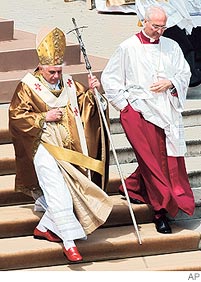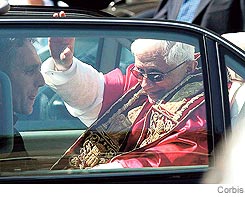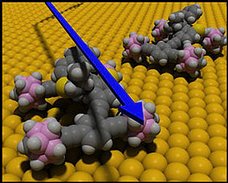"Piled Higher and Deeper" as one comic strip puts is. Moi working on the analysis of Cyber-Physical Systems and security. Here at UIUC. This blog has nothing really to do with my research/work/etc...just some random musings, along with some hard opinions...
Friday, April 28, 2006
Microsoft's Linux Lab!
The page though, is a place for the folks who work in the lab to express their thoughts, ideas, etc. Now, what will the open source community do ? I mean, now that MS is a part of their community, how can they drive themselves ? For a long time, taking on the behemoth at Seattle was part of the drive for a lot of folks...so, I guess this would probably cause a lot of people some existential anguish ! (chuckle ! chuckle !)
Hey, don't get me wrong...I'm not taking sides...my philosophy is simple : use whatever technology/platform you require to solve your problem at hand...sometimes its Unix/Linux...sometimes its Windows...heck if only Visual Studio's editor could have vi's capabilities ! I guess some things are too much to wish for.
But I guess this tops the list of my "the times they are a changin' " series.
Previous posts on "the times they are a changin'" series : 1, 2, 3, 4, 5.
World Science.
World Science.
Thursday, April 27, 2006
"Birdbrain" ? Think again...
 The European Starling might make that a compliment, rather than an insult...
The European Starling might make that a compliment, rather than an insult...Apparently these birds can recognise complicated grammars that were thought to have been the exclusive privilige of humans !
Some excerpts...
A common characteristic of human grammar is inserting words and clauses within a sentence, without limit.But this belief might received a serious challenge...further excerpts...
...
Chomskian linguists believe that this characteristic, known as recursive centre embedding, is a universal feature of human language, and the ability to process it forms the core of human language ability.
Gentner and colleagues generated 16 artificial starling songs, which followed two different patterns.
Similar to human grammar, the first set allowed for a sound to be inserted in the middle of a song, a simple form of recursive center embedding.
The next set of eight songs followed the finite state rule, whereby a sound could only be added at the beginning or end, a type of structure attributed to non-human communications.
After more than 10,000 trials, nine birds eventually learned how to distinguish the patterns of the two songs.
...
To see if the birds could use the same rules to distinguish patterns of longer pieces, the researchers then subjected the birds to longer strings of song. And the birds were able to make the distinctions.
Wonder what, if anything, can be used to distinguish human "intelligence" from those aof animals now...
Tuesday, April 25, 2006
Indrajal database.
The Comic Project is a treasurehouse of Indrajal Comics !
"God treat them well, for they have brought forward hidden treasures to those of us with the thirst !"
Paedophilia hysteria.
In 2002, two year old Abigail Rae drowned in a village pond in England. Her case recently revealed an explosive fact...
A passerby was afraid to guide the lost child to safety, for fear of being labelled as a "pervert" !
An excerpt...
Clive Peachey, a bricklayer, drove past a child on her own, whom he later concluded had been Abby. She was not walking straight, she was tottering, said Mr Peachey. "I kept thinking should I go back? One of the reasons I did not go back is because I thought someone would see me and think I was trying to abduct her.While this freak case ended tragically with the child's death, with many wishing that he had made an effort to restore the child to its parents, precedent in other cases shows that he might have been taking the safe route...for ex., a man who grabbed a girl by the arm to tell her about road safety, when she stepped in front of his car and he had to swerve to avoid her, was labelled as a sex-offender ! An excerpt...
He then got out of his car, took her by the arm and gave her a lecture about how stepping in front of a vehicle is a very bad idea.So tell me, why would any person, particularly a male of the species, go to help a child in distress?
The girl ran away, complained to police and Barnaby was charged with - again no joke - attempted kidnapping and child abduction. This is even though he didn't attempt to take the girl anywhere. Barnaby beat those charges.
He was, however, convicted of unlawful restraint of a minor. And in Illinois, that is considered a sex offense.
That means even though he didn't do anything to the kid other than take her by the arm and give her a lecture that might end up saving her life, he must register as a sex offender. He is prohibited from living near a park or school and must keep local police advised as to his place of residence.
He might even get his name and picture in the local newspaper, to advise neighbors they're living near a sex offender.
Original link via Fox News.
Holy product placement.
But apparently there's someone around who has a much greater following than all A-list stars put together and is under a constant media glare. Product placement would be ideal for this person, would it not ? Seems like a no-brainer...but consider this...
what if the person being discussed was the Pope ?Some excerpts...

Since his election last year, the pope has been spotted wearing Serengeti-branded sunglasses and brown walking shoes donated by Geox. He owns a specially engraved white Apple iPod, and he recently stirred much publicity with a pair of stylish red loafers that may or may not be from Prada.Might be ideal, as he has a dedicated following that most celebrities know is out of their reach - over a billion people ! Hmmm...what about the ethics of this idea ? But then again, the Pope is not being paid by the designers to advertise their products for them. It is just a lucky coincidence of "gifts" given to them, that have achieved fame - a happy circumstance.
But not all of it is positive...you would think that advertisers would be jumping to the moon to get his holiness to wear their product...not really, for there is a dilema...

But unlike movie stars, who can command huge sums for product endorsements, or the queen of England, who discreetly allows companies to mention royal patronage, the pope, as the moral and spiritual leader of more than one billion Catholics, endorses holiness and chastity but not products.
That means companies have to hope the pontiff uses a product they have donated to him and then tastefully note the event, or delicately capitalize on a photograph showing the 79-year-old theologian using or wearing a particular brand. Astute marketers say the key words are "tastefully" and "delicately." Pursuing pope-and-product juxtaposition poses risks. Brands have to be careful not to appear opportunistic or they could risk a backlash with the pope's followers. "The question of endorsing products, especially from a figure such as the pope, raises an enormous number of questions in terms of the ethics of each company," says Ben Cronin, general manager and research director of S.Comm, an international advertising-research firm.
Gas guzzler? More like gas cleaner !
 Scientists at Rice University have created a nanocar !
Scientists at Rice University have created a nanocar !Some excerpts...
At just 169 atoms, it's the smallest motorized vehicle ever made. Better yet, it runs on ultraviolet light. And say goodbye to those endless searches for parking spaces. About 20,000 of these babies can fit side to side across the diameter of a human hair.And the mechanical details...
the vehicle has four "wheels" that are cagelike structures of about 25 atoms each, mounted on "axles" that are freely rotating chemical bonds. The car is powered by a paddle-wheel-like device that turns in response to a specific wavelength of lightWonder what miracles it can achieve for medicine...accurately transporting medicine to cells that require them, or even other nano structures that could help combat diseases/cancers, etc.!
And the best part...
And since a trillion trillion of them are made at a time in a series of chemical reactions, he added, they should be cheap enough to discard after one trip each.
Thursday, April 20, 2006
Respect wins you a spot in space...and history !
 Yuri Gagarin made history when he was picked to be the first human being to travel to space. Not only did he become a Russian icon, but also an international one. So what was it that made him unique enough to get that spot ? Was it his physical toughness, his mental capabilities or his proletarian credentials ? Hardly...
Yuri Gagarin made history when he was picked to be the first human being to travel to space. Not only did he become a Russian icon, but also an international one. So what was it that made him unique enough to get that spot ? Was it his physical toughness, his mental capabilities or his proletarian credentials ? Hardly...The real reason was publicised last week to rekindle Russian pride...and the real reason for picking him ahead of the five other candidates that were being considered...
it was the fact that he took his shoes off when climbing into a prototype of the craft for a look around.Touched by such a show of respect, the head of the space exploration programme, Sergei Korolev, decided that Gagarin should be the man for the historic 108 minute flight into space in April 1961.
Well, looks like a show of respect will get you to the heavens ! Now considering that this concept has been around in India for centuries, what did Rakesh Sharma have to do to prove his credentials - I mean, almost all of the Indian wannabes would have shown their respect...wouldn't they ?
Friday, April 14, 2006
Not a penny more, nor a penny less...
Some excerpts...
The soaring prices of zinc and copper have prompted fears in the US over the future of its one cent coin.So, what is the solution ?
...
In the US, the issue is the steeply-rising cost of zinc. Cent coins were once almost entirely made from copper - but the increasing copper price meant that in 1982 they switched to being made from 97.6% zinc and only 2.4% copper. The changeover to cheaper metals brought annual savings to the US Treasury of around $25m (£14m). If zinc becomes unaffordable, expect further changes.
The same as it has been for hundreds of years, says Mr Chard. Reduce the proportion of the expensive metal, switch entirely to a cheaper metal or withdraw the coin.
Heart backup.
 A Welsh girl had a heart transplant a decade ago, but the with a difference. Her original heart was left in place, to give it some rest ! But apparently, surgeons have removed the implanted heart, and the original one has kicked in and started functioning normally !
A Welsh girl had a heart transplant a decade ago, but the with a difference. Her original heart was left in place, to give it some rest ! But apparently, surgeons have removed the implanted heart, and the original one has kicked in and started functioning normally !Excerpts...
As a toddler, Hannah suffered from cardiomyopathy, a condition that made her heart flabby, pump blood weakly and double in size. As a result, she received a piggyback transplant, technically known as a heterotopic transplant, a procedure used when the new organ is very small, when there are doubts about its condition, or when the removal of the native heart would create complicating conditions.
She began to reject the transplanted organ this year, and surgeons removed it on Feb. 20. When they did, they found that her own heart had repaired itself.
...
The donor heart was placed in the right side of Hannah's chest and connected to her own heart's aorta, right atrium and left atrium. "This means both hearts can pump, but the new heart takes most of the load," the physicians said.
That's one for the synergy between medical science and nature !
Tuesday, April 11, 2006
C++ Blogs !
His blog, as expected, is a treasure house of amazing C++ knowledge...read on...
Thursday, April 06, 2006
Ethnic bias in the law...
Now, the American Civil Liberties Union (ACLU) has accused federal investigators of ethnic bias in the operation.
Excerpts...
In a legal filing, the A.C.L.U. said yesterday that prosecutors ignored extensive evidence that white-owned stores were selling the same items to methamphetamine makers and focused instead on South Asians to take advantage of language barriers.
...Documents filed by the A.C.L.U. yesterday include a sworn statement from an informant in the sting, saying that federal investigators sent informants only to Indian-owned stores, "because the Indians' English wasn't good." The informant said investigators ignored the informant's questions about why so many South-Asian-owned stores were visited in the sting.
Other filings said prosecutors had several tips that more than a dozen white-owned stores were selling the same ingredients, but failed to follow up on them. According to a sworn statement from a witness, law enforcement officials tipped off a white store owner about the investigation and recommended ways to avoid scrutiny.
And here is the most interesting point...
Of 629 convenience stores in the six-county area in the sting, 80 percent are owned or operated by whites, according to the A.C.L.U.'s court filing, but fewer than 1 percent of the stores in the sting are white-owned or operated. The filing said the clerk at the only white-operated store was known widely as a methamphetamine addict whose husband was in prison for making the drug. None of the Indians charged are accused of using or making methamphetamine.
Of course it gets more interesting...
To date, he said, 23 defendants have pleaded guilty, and eight cases have been dismissed. Some of those cases were dismissed because prosecutors charged the wrong people because of confusion over names; more than 30 of the defendants share the common Indian surname Patel.
So, not only are they targetting Indian grocery store owners, but they also caught the wrong Indians, just 'cos their names were similar...and not just one or two, but eight people !
Where do these people get off by defending themselves after such deliberate bias has been proven ? Even the circumstantial evidence damns them...I mean, in an area where 80 % of the stores are white-owned, less than 1 % of the stores that formed a part of the sting are white-owned ! What possible explanations can the authorities have for this lopsided operation ? Did God visit from the heavens and inform them that only Indians are culpable for selling meth ingredients !
Previous posts on this issue : 1.
Monday, April 03, 2006
"Forward the future".
The first one, titled "Forward the future", regarding some basic tips on applying to graduate school in the US appeared on March 10, 2006.
It is reproduced below...
"Forward the future"
Three or four years spent towards working on that degree... maybe a year or two cracking away at that desk job... somewhere along the line, many of us feel the need to break away and want to learn more, see the world, see what we have really missed in our education. Enter the study abroad option. And the most popular destination for students worldwide remains the United States, in no small measure due to the opportunities available here.
3.5 years into my PhD programme in Computer Science, I look back at my application procedure. The question arises - is it still relevant? The answer is a resounding "yes!". What changes, is the actual numbers.
The number of applicants and the intake of a particular university depend on the economic status of both countries - the one from which students apply and the receiving country as well. If there is an economic boom and jobs are available easily in the home country, then the number of applications drop as compared to when there is a slump and jobs are harder to come by. During a slump the competition for a particular university shoots up as more eligible candidates have now thrown their hats into the ring.
When the economic situation of the host country or even the university/ state is not good, then one of two extreme situations may occur -
a) some departments/ schools may reduce the intake of international students, as they are unable to support a large population, or they may drastically increase their intake (thus diluting their quality) to obtain the larger fees that international students bring (and hope that these students are able to get by without funding/support). Actually an economic slump hits universities a year or two after it has actually started, because that is when the funds/ grants dry out and newer ones are hard to come by. So, they are harder to gauge/ plan for.
These factors are not under the control of the applicant. All that one hopes for, is that his or her application is capable of being noticed at a good university and also there are sufficient funds available to obtain an assistantship.
The number one activity for an application (and I cannot stress on this enough) is research. Before and after you have written you GRE/ TOEFL and other exams, you must spend enough time to chart out which universities you would seriously like to apply to. It is absolutely imperative that you pore through the university and department websites to obtain as much information as possible on the following topics...
Research areas/ interests - Find univs that focus on or are close to the areas that you would like to study/ perform research on. Most universities and professors put up detailed information about their projects/ publications etc. online. Make sure you read them and also try to understand some of their research papers. This first step will be the foundation for the rest of your application process. Information about projects that are funded are easily found on most department and faculty web-pages.
Once you have a list of about 15-20 universities that match up with your areas of interest and reasonable funding sources, rank them in the order of (a) preference and (b) university/ department ranking. Pick schools such that the majority of schools fall into the middle category - ones that you would like to study at and have a realistic chance. You can also pick a couple of really good ones and some of the lower ranked ones. How many you must actually pick depends on you and your confidence level. I would say about 5-8 is par.
Contact current and erstwhile students of the departments you are applying to. But first take the time and effort to do some serious research yourself. They will not really be able to guide you on general questions, such as "What univs should I apply to?" or "Will I get an admission into your department... I have a score of X, Y, Z, etc.", as they are seriously unaware of how students are really admitted. That decision if made by a faculty committee. Specific, well-thought out questions such as "Does professor M work on field A?" or "Does your department have courses related to fields P, Q, R" or even "What are the prospects of on-campus jobs?" will get honest, helpful responses.
There are definite ways to increase your chances:
1. Research. This gives you a great weapon to improve your chances for admission/ funding.
2. A good SOP.
3. Projects, publications and work experience in relevant areas. These are invaluable. The more you have of these in your resume/SOP the better. Also it's not very useful if you have a background in computer science and you are applying for biomedical engineering .Relevant experience is what counts.
4. Recommendations, GRE/ TOEFL scores. Unless you are from IIT/ BITS Pilani and a few other selected schools in India, your recos are probably just a formality. Most schools and faculty members do not take them seriously as they have gotten wind of the fact that recos are a dime a dozen and often self-written. So your GRE/ TOEFL scores count for a lot.
5. Subject GRE test: In computer science, the subject GRE test is also a good way to increase your chances - take the test and do well, you can almost be guaranteed of success in admissions/ funding.
6. Your choice of schools/ departments/ research projects/ faculty and any interest you are able to develop among the faculty members as a result of your communication with them.
Statement of Purpose
There are other positive advantages of having obtained solid information about universities and departments. The statement of purpose (SOP) for one. You should ideally tailor one for each college that you are applying to, and mention your interests in fields that they excel in or have ongoing research projects.
This way:
(a) you will get their attention and
(b) you will come across as a serious candidate. Do not write too many generalisations in the SOP. Stick to your background, academic and professional, projects, publications, course/ research interests, etc. And mention why you like what they do and why and how your background uniquely identifies you as the ideal candidate.
Another side-effect of having done good background research is that you can contact professors in the department and start a relationship with them. You can start by expressing interest in their work, clear any queries you may have about their papers/ projects/ etc. This way you again establish yourself as being seriously interested.
Some professors do not take it kindly to being contacted BEFORE you have an admissions, but that is a risk you run. I would suggest not to talk about funding from the beginning. Wait for a while for some kind of interest to build on their side before you ask about funding/ RA/ TA etc. Typically, if you haven't been offered funding from the department at the time of admission, then most professors would like you to come down and meet them/ take their course/ work with them before they commit to funding you, if at all. In my opinion, most professors will work hard to obtain some source of funding for students that they feel are able to work hard and produce some results.
Also I would seriously reconsider committing to a PhD unless you are absolutely sure of wanting to go down that lane. Some students commit to a PhD in the hope of better funding chances, but they then drop out after a Masters and on receipt of a job offer. This kind of behaviour leads to bad blood in the department, especially among faculty members, and it could harm prospects for future generations of students from your college/ university/ city and even country. Hence, one should refrain from making this commitment unless one is absolutely sure of backing it up.
These thoughts are based on my collective experiences over the last three odd years in graduate school in the US. Wish you all good luck with the application procedure!